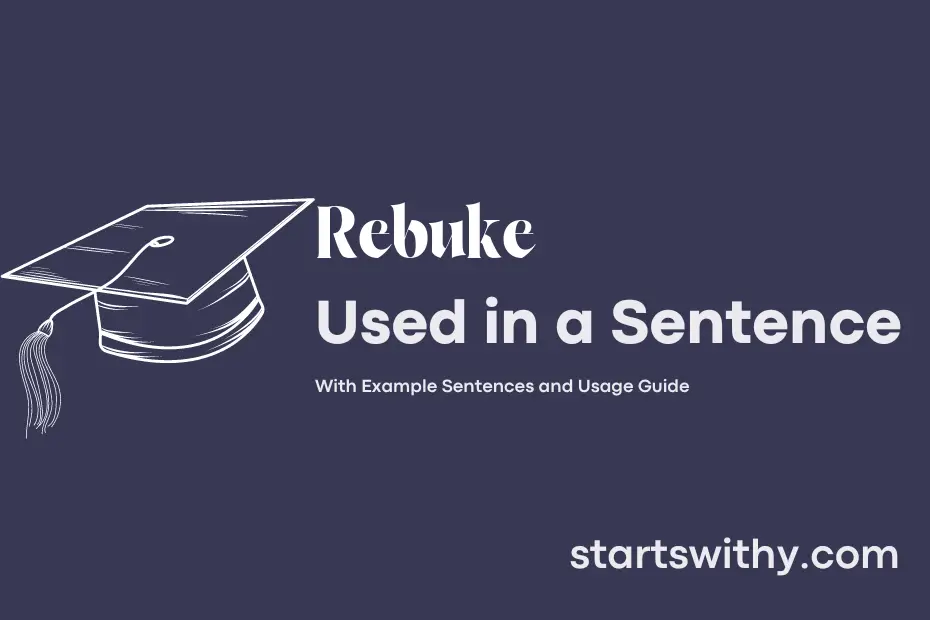Have you ever wanted to express disapproval or criticism towards someone or something in a clear and direct manner? This act of rebuking, which involves reprimanding or scolding, can be a powerful tool in asserting boundaries or conveying displeasure.
A rebuke can be delivered in various forms, whether it’s through words, actions, or simply non-verbal expressions. It serves as a way to address wrongdoing, correct behavior, or simply express disappointment.
7 Examples Of Rebuke Used In a Sentence For Kids
- Do not shout in the classroom, the teacher will rebuke you.
- Remember to raise your hand before speaking, or you may receive a rebuke.
- Do not run in the hallway, the teacher will rebuke you for that.
- Always listen to your elders and don’t make them rebuke you.
- Use gentle words when talking to others to avoid a rebuke from the teacher.
- Follow the rules to avoid any rebuke from the teacher.
- Be kind and helpful to your friends, you won’t receive any rebuke that way.
14 Sentences with Rebuke Examples
- Rebuke your friend if they constantly interrupt you during group discussions.
- Don’t be afraid to rebuke a classmate who copies your assignments.
- It is important to rebuke any form of discrimination or prejudice in the classroom.
- If someone is talking loudly on their phone in the library, feel free to rebuke them politely.
- As a group leader, you may need to rebuke members who are not pulling their weight in group projects.
- It is not acceptable to rebuke a professor in front of the whole class.
- When faced with a disrespectful comment, it is appropriate to rebuke it assertively.
- If a roommate is continually breaking house rules, it may be necessary to rebuke them.
- As a college student, it is important to rebuke any form of academic dishonesty.
- In group presentations, it is crucial to rebuke any member who is not contributing equally.
- Remember to rebuke any form of offensive language or behavior in social settings.
- Rebuke those who try to take advantage of your kindness or generosity.
- It is necessary to rebuke any peer pressure that may lead you astray from your goals.
- If a friend is spreading rumors about you, don’t hesitate to rebuke them and set the record straight.
How To Use Rebuke in Sentences?
To use “Rebuke” in a sentence, you can follow these steps:
-
Understand the meaning: Rebuke means to express sharp disapproval or criticism towards someone because of their actions or behavior.
-
Choose the context: Think of a situation where you want to express your disapproval or criticize someone politely yet firmly.
-
Construct the sentence: Start your sentence with the person you are addressing followed by the bolded word Rebuke. For example, “I had to rebuke my coworker for constantly coming in late to work.”
-
Provide reason: To make your sentence more impactful, you can add a brief explanation of why you are rebuking that person. For instance, “The manager had to rebuke the team for not meeting the project deadline.”
-
Practice using it: Try using rebuke in different sentences to get more comfortable with incorporating it in your daily conversations.
-
Be respectful: While rebuking someone, it’s important to maintain a respectful tone and focus on their behavior rather than attacking their character.
Remember, using rebuke in a sentence can help you communicate your disapproval effectively while promoting constructive dialogue.
Conclusion
In conclusion, the use of sentences with “rebuke” demonstrates a strong and direct way to express disapproval or criticism towards someone’s actions or behavior. These sentences often convey a sense of sternness and authority, aiming to admonish or reprimand the individual for their perceived wrongdoings. By employing sentences with “rebuke,” one can assertively communicate their displeasure and set clear boundaries, effectively highlighting the need for correction or change in behavior.
Whether in personal relationships, professional settings, or public discourse, sentences with “rebuke” serve as powerful tools for holding others accountable and emphasizing the importance of ethical conduct. Through clear, assertive language, individuals can effectively address breaches of conduct and uphold standards of morality and respect. Ultimately, sentences with “rebuke” play a crucial role in maintaining accountability and fostering a culture of integrity and accountability in various aspects of life.



